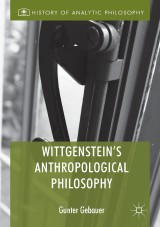Details

Wittgenstein's Anthropological Philosophy
History of Analytic Philosophy
|
96,29 € |
|
| Verlag: | Palgrave Macmillan |
| Format: | |
| Veröffentl.: | 14.08.2017 |
| ISBN/EAN: | 9783319561516 |
| Sprache: | englisch |
Dieses eBook enthält ein Wasserzeichen.
Beschreibungen
This book explores how Wittgenstein’s personal life provided more of a reference point for his philosophical work than has been previously thought. Focusing on two key phases in Wittgenstein’s life during which he dramatically changed his philosophical orientation and reinvented both his intellectual methods and himself, the author presents and alternative understanding of Wittgenstein and his work. The book firstly addresses the period of his “anthropological turn” (1929-1932), in which Wittgenstein developed one of his central arguments concerning the role of the body in the acquisition of language and the rules of social practice. The second key phase, commencing after the end of the Second World War, was one of introspection, during which Wittgenstein became intensely preoccupied by inner events, sensations, and his own personality. As his work evolved, the anthropological aspects became the primary focus of his work by the end of his life. Providing an accessible and novel insightinto Wittgenstein’s work and his interest in ‘continental’ philosophy, this translation will appeal to a wide audience.<p></p>
<p>Chapter 1. The Practice of Philosophy.- Chapter 2. From Seeing to Practice.- Chapter 3. The Turn to Anthropology.- Chapter 4. Intentions and Perspectives of the Language Game.- Chapter 5. The Interaction between Rules and Habitus.- Chapter 6. Materialism and Belief.- Chapter 7. Wittgenstein’s Pictures: Aspect-Seeing and Experience.</p><p></p>
<p>Gunter Gebauer has been Professor for Philosophy at the Free University Berlin, Germany, since 1978. He is a former member of the centers of excellence “Performative Cultures” and “Languages of Emotion”. His primary research interests include historical anthropology, social philosophy and language theory.</p><p></p>
This book explores how Wittgenstein’s personal life provided more of a reference point for his philosophical work than has been previously thought. Focusing on two key phases in Wittgenstein’s life during which he dramatically changed his philosophical orientation and reinvented both his intellectual methods and himself, the author presents and alternative understanding of Wittgenstein and his work. The book firstly addresses the period of his “anthropological turn” (1929-1932), in which Wittgenstein developed one of his central arguments concerning the role of the body in the acquisition of language and the rules of social practice. The second key phase, commencing after the end of the Second World War, was one of introspection, during which Wittgenstein became intensely preoccupied by inner events, sensations, and his own personality. As his work evolved, the anthropological aspects became the primary focus of his work by the end of his life. Providing an accessible and novel insightinto Wittgenstein’s work and his interest in ‘continental’ philosophy, this translation will appeal to a wide audience.<p></p>
Draws attention to an essential overlooked characteristic of Wittgenstein's philosophy Explores Wittgenstein’s roles as engineer, logician, school teacher, architect and philosopher Highlights Wittgenstein's interest in continental philosophy as opposed to the Anglo-Saxon interpretation of his works
“Gebauer’s book develops a view of Wittgenstein that is certainly new, original, surprising, and stimulating. The author has, to a large extent, kept his initial promise to show that the anthropological way of seeing and thinking is much more central and, explicitly or implicitly, present and active in many more places in Wittgenstein’s philosophical remarks than is commonly believed.The strength of Gebauer’s approach is that it allows us to put together a wide variety of Wittgensteinian remarks, suggestions, questions, and answers in a unified and sometimes quite unexpected way.” (Jacques Bouveresse, Professor of Philosophy, Collège de France, France) <p>“The great achievement of Gebauer’s book is that it contributes an interpretation to the Wittgenstein discussion that is original in numerous respects. In its emphasis on the anthropological aspect of Wittgenstein’s thought, it has not only filled a gap in our understanding of Wittgenstein, but has also highlighted a quintessential aspect of his philosophical work. Gebauer’s book brings an intimate understanding of Wittgenstein’s writings together with a clear thesis, and stimulates the reader to continue exploring this practical thinking, and also to extend it further, in a positive sense, beyond Wittgenstein himself.” (Matthias Kross, Researcher at the Einstein Forum, Germany)</p>
Diese Produkte könnten Sie auch interessieren:

Karl Schuhmann, Selected papers on phenomenology

von: Karl Schuhmann, Cees Leijenhorst, Piet Steenbakkers

149,79 €















